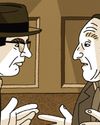
Before the gig economy consumed a third of the workforce, it was mostly musicians who worried about gigs. There are debates about the origins of the word-some believe it derives from an eighteenth-century term for horse-drawn carriages that may have doubled as stages for performers, while others contend that it was adapted from a Baroque dance called the gigue. But the "gig," as shorthand for a casual, oneoff paid performance, entered the popular lexicon during the Jazz Age of the nineteen-twenties and thirties. There was a mystique to the gigging musician wandering the big city in search of work, because this work was creative, improvisational, at times transcendent.
Young people who came of age before the twenty-first century, Franz Nicolay argues in a new book called "Band People: Life and Work in Popular Music," could be forgiven for assuming that working one's way up from gigs to a steady job in music was a plausible career path. You might not make it as a chart-topping star, but there were still opportunities for "band people"the "hired guns" or "side-of-the-stagers" who offered structure and support.
Music was everywhere, and there had to be people to play it. Nicolay's book details the lives of working musicians, especially those far from the spotlight: background vocalists hired for uncredited recording sessions, rhythm guitarists playing on freelance contracts. Not that the spotlight in question shines all that brightly to begin with; most of the dozens of artists Nicolay spoke to work in commercially tenuous realms, such as indie rock or punk, in which a band like Sonic Youth represents the imagination's zenith.
This story is from the {{IssueName}} edition of {{MagazineName}}.
Start your 7-day Magzter GOLD free trial to access thousands of curated premium stories, and 9,000+ magazines and newspapers.
Already a subscriber ? Sign In
This story is from the {{IssueName}} edition of {{MagazineName}}.
Start your 7-day Magzter GOLD free trial to access thousands of curated premium stories, and 9,000+ magazines and newspapers.
Already a subscriber? Sign In

Hatagaya Lore Bryan Washington
We moved to Tokyo from Dallas because of my husband's job, an unexplainable tech gig.

A MATTER OF FACTS
On the loss of two sons.

OPEN SECRET
Why did police let one of America's most prolific predators get away for so long?

BEYOND THE CURVE
In medicine and public health, we cling to universal benchmarks—at a cost.

Richard Brody on Pauline Kael's "Notes on Heart and Mind"
When Pauline Kael joined The New Yorker’s staff as a movie critic, in January, 1968, the world of cinema was undergoing drastic change.

CHORAL HISTORY
“The Alto Knights.”

THE ELEMENTS OF STYLE, 2025
Reliable news coverage has never been more important than it is now. Journalists must remain vigilant and rigorous in the face of a second Trump Administration. To help them do so, we are releasing an updated version of Strunk and White’s “Elements of Style.” Please refer to the following examples when writing and reporting, for as long as that’s still allowed.

CHARACTER STUDIES
“Purpose” on Broadway and “Vanya” downtown.

DO YOU KNOW JESUS?
Why the Gospel stories won’t stay dead and buried.

HOME SLICE
The making of an Indian American specialty.
